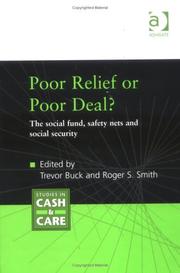| Listing 1 - 10 of 700 | << page >> |
Sort by
|
Book
ISBN: 2707181544 Year: 2008 Publisher: Paris (9bis, rue Abel Hovelacque 75013) : La Découverte,
Abstract | Keywords | Export | Availability | Bookmark
 Loading...
Loading...Choose an application
- Reference Manager
- EndNote
- RefWorks (Direct export to RefWorks)
En 1988, la création du revenu minimum d'insertion (RMI) a marqué un réel tournant dans l'évolution du système français de protection sociale. Dernier filet de sécurité pour assurer un revenu minimum aux personnes les plus démunies et jusqu'alors exclues du système, il a constitué une véritable innovation en organisant, parallèlement au versement d'une allocation, l'insertion des personnes concernées. Il est entré en 2008 dans sa vingtième année, avec la perspective de mise en place d'un revenu de solidarité active (RSA) à l'horizon 2009 : celui-ci peut ouvrir à des changements majeurs s'incarnant dans une réforme globale des minima sociaux et des politiques d'insertion qui les accompagnent. S'appuyant sur les dernières enquêtes statistiques et données administratives disponibles, cet ouvrage apporte des éclairages sur les publics bénéficiaires du RMI. Il permet de faire le point sur différents aspects au cœur des débats qui entourent la préparation du RSA : niveaux de vie et conditions de vie des bénéficiaires du RMI, parcours des populations concernées, efficacité des dispositifs mis en place pour permettre leur insertion sociale et professionnelle, résultats de la décentralisation du dispositif depuis 2004. Cet ouvrage est coordonné par la Direction de la recherche, des études, de l'évaluation et des statistiques (DREES), qui a lancé plusieurs enquêtes statistiques sur le sujet et participe à l'évaluation et au suivi statistique des effets de la décentralisation.
Book
Abstract | Keywords | Export | Availability | Bookmark
 Loading...
Loading...Choose an application
- Reference Manager
- EndNote
- RefWorks (Direct export to RefWorks)
Book
Year: 2010 Publisher: Washington, D.C. : Library of Congress, Congressional Research Service,
Abstract | Keywords | Export | Availability | Bookmark
 Loading...
Loading...Choose an application
- Reference Manager
- EndNote
- RefWorks (Direct export to RefWorks)
This report describes IDA programs funded by two major federal grants: the Assets for Independence (AFI) Act of 1998 and the Temporary Assistance for Needy Families (TANF) program created in the 1996 welfare reform law.
Book
ISBN: 9783631739457 Year: 2018 Publisher: Berlin New York [etc.] Peter Lang
Abstract | Keywords | Export | Availability | Bookmark
 Loading...
Loading...Choose an application
- Reference Manager
- EndNote
- RefWorks (Direct export to RefWorks)
Book
ISBN: 3631744870 3631744862 Year: 2018 Publisher: Berlin : Peter Lang,
Abstract | Keywords | Export | Availability | Bookmark
 Loading...
Loading...Choose an application
- Reference Manager
- EndNote
- RefWorks (Direct export to RefWorks)
Against the background of a high incidence of long-term benefit receipt and an increasing focus of interventions on the individual beneficiary, this study shows how individualised policies within the German minimum income scheme serve long-term beneficiaries as a way out of benefit receipt. By applying a qualitative research design, the link between individual appropriations of policies and individual life planning is reconstructed in the form of an empirically grounded typology. The analysis shows that individualised policies are ridden with prerequisites. Beneficiaries, that are not able to expertly appropriate them and to plan in the long-term, face unintended consequences like a limitation of life planning, a separation from the scheme or an establishment within entitlement.

ISBN: 0754633357 9780754633358 Year: 2003 Publisher: Aldershot: Ashgate,
Abstract | Keywords | Export | Availability | Bookmark
 Loading...
Loading...Choose an application
- Reference Manager
- EndNote
- RefWorks (Direct export to RefWorks)
Income maintenance programs. --- Public welfare. --- Income maintenance programs --- Public welfare
Book
Year: 2005 Publisher: Washington, DC : World Bank,
Abstract | Keywords | Export | Availability | Bookmark
 Loading...
Loading...Choose an application
- Reference Manager
- EndNote
- RefWorks (Direct export to RefWorks)
In the absence of household level data on participation in public programs, spending allocations and poverty measures across regions of Morocco are used to infer incidence across poor and non-poor groups and to decompose incidence within rural and urban areas separately, as well as to decompose improvements in enrollment rates across poor and non-poor children by gender. Programs appear to be well targeted to the rural poor but not to the urban poor. Substantial benefits accrue to the urban non-poor, while benefits largely bypass the urban poor. The analysis also uncovers evidence of impressive progress in primary and secondary school enrollments for the poor, as well as for poor girls since 1994. However, here too, the gains are concentrated on the rural poor. This paper-a product of the Public Services Team, Development Research Group-is part of a larger effort in the group to assess the incidence and targeting of public expenditures.
Income maintenance programs. --- Income maintenance programs --- Poor --- School attendance
Book
Year: 1974 Publisher: [Madison]: University of Wisconsin-Madison. Institute for research on poverty,
Abstract | Keywords | Export | Availability | Bookmark
 Loading...
Loading...Choose an application
- Reference Manager
- EndNote
- RefWorks (Direct export to RefWorks)
Book
Abstract | Keywords | Export | Availability | Bookmark
 Loading...
Loading...Choose an application
- Reference Manager
- EndNote
- RefWorks (Direct export to RefWorks)
Book
ISBN: 1912387069 Year: 2017 Publisher: Edinburgh : Luath Press Limited,
Abstract | Keywords | Export | Availability | Bookmark
 Loading...
Loading...Choose an application
- Reference Manager
- EndNote
- RefWorks (Direct export to RefWorks)
| Listing 1 - 10 of 700 | << page >> |
Sort by
|

 Search
Search Feedback
Feedback About UniCat
About UniCat  Help
Help News
News